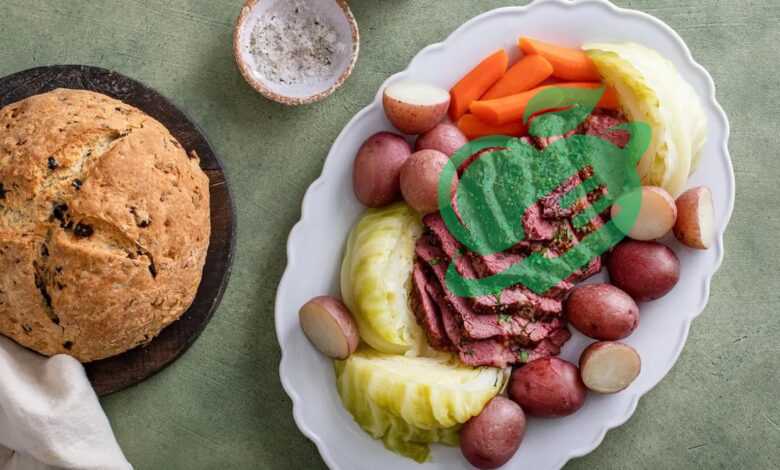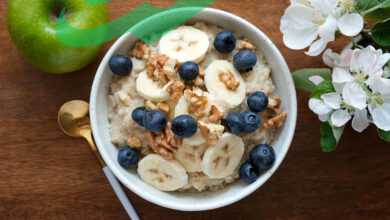
What is Corned Beef?
Corned beef is a neat kind of preserved meat that’s become super popular in many cuisines around the world. It’s mostly made from brisket, and it goes through a special curing process with big salt grains, which is how it got the name “corned” beef. The result is a tasty, tender meat that’s just perfect for sandwiches, stews, and classic dishes like corned beef and cabbage.
Picture this: you’re at a busy deli, the smell of spices filling the air as you order a classic Reuben sandwich. It’s packed with layers of corned beef, sauerkraut, and melty Swiss cheese, all nestled between slices of rye bread. You can’t help but fall in love with its hearty vibe. Many folks think of it as comfort food, bringing back cozy memories of family gatherings and special occasions.
History and Origins of Corned Beef
Beef has a long history that stretches back, with roots in different cultures.
- Ancient Roots: People have been salting meat for a long time, dating back to ancient Romans and Egyptians.
- Irish Influence: Corned beef became tied to Irish food during the 17th century because of English cattle farming. It turned into a staple for Irish immigrants in the U.S., especially around St. Patrick’s Day.
Read also: Protein diet: How much do you lose weight per week?
Nutritional Composition of Corned Beef
Protein Content
When you dig into the nutritional side of corned beef, one of the standout features is its awesome protein content. Just one serving gives you a solid boost in your daily protein intake.
- High Protein Source: A regular 3-ounce serving of corned beef has around 25-30 grams of protein.
- Muscle Maintenance: If you’re looking to build or keep muscle, the amino acids in protein are super important. Enjoying corned beef is a tasty way to get those necessary nutrients in your diet.
For a lot of people, especially those who stay active, a hearty beef sandwich is the ideal post-workout meal to help restore energy and support recovery.
Fat Content
While corned beef is great for protein, it’s also important to take a look at its fat content.
- Moderate Fat Levels: On average, a 3-ounce piece contains about 15-20 grams of fat.
- Saturated Fats: A chunk of that fat is saturated, so if you’re watching your fat intake, that’s something to keep in mind.
But hey, if you’re enjoying corned beef, picking leaner cuts can help keep fat in check while still giving you that great taste.
Vitamin and Mineral Profile
Aside from protein and fat, corned beef is loaded with essential vitamins and minerals that are great for your health.
- Iron: It’s a fantastic source of iron, which helps keep your blood and energy levels healthy, making it essential for active lifestyles.
- B Vitamins: Especially B12, which is key for nerve function and making red blood cells.
- Zinc: Also has a good amount of zinc, which supports your immune system and helps with healing wounds.
This combination of nutrients not only makes salt beef a delicious choice, but also beneficial when consumed in moderation. Whether you’re eating it for protein or essential minerals, it boasts a robust flavor and unparalleled health benefits.

Health Benefits of Corned Beef
Corned beef is not just tasty; it’s also a treasure trove of essential nutrients your body needs. As we’ve mentioned, it’s rich in protein, iron, and several B vitamins.
- Iron: Keeping up your iron levels is super important for preventing anemia and helping energy production. This is especially crucial for active folks, including athletes and anyone on the go.
- B Vitamins: Especially B12, which supports brain health and nerve function. Eating foods high in B vitamins regularly can help you feel energized.
I remember my grandma always saying a good meal should nourish you and taste great too. For her, corned beef was often the star of our family dinners, bringing flavor and nutrition together.
Potential Benefits for Muscle Building
If you’re into fitness or trying to build muscle, it can be a great addition to your diet.
- High-Quality Protein: The complete proteins in corned beef give you the amino acids you need for muscle repair and growth.
- Convenience: Making a quick corned beef sandwich or tossing it into salads is an easy way to meet your protein needs without a lot of cooking.
Role in a Balanced Diet
While corned beef is definitely nutritious, balance is the name of the game in any diet. Adding it to a varied diet can bring about great health benefits.
- Serving Suggestions: Team corned beef up with veggies, whole grains, or legumes to boost fiber and variety in your meals.
- Moderation is Key: Because it has salt, it’s smart to enjoy corned beef in moderation to keep your heart healthy.
If you mix corned beef with fresh produce and whole foods, it can be a delicious way to support your health without losing out on flavor.
Read also: The Hair Health Diet: How to Eat Your Way to Gorgeous, Strong Hair

Considerations and Precautions
Sodium Content
While corned beef is loved for its flavor and nutritional benefits, it’s smart to keep an eye on its sodium content. The curing process throws in a lot of salt, which really bumps up sodium levels.
- High Sodium Levels: A regular serving can have around 800-1,000 mg of sodium or more, depending on how it’s prepared.
- Health Risks: Too much sodium can lead to high blood pressure and increase the risk of heart disease and stroke.
For people with sodium sensitivity or following a heart-healthy diet, it’s important to monitor the amount and frequency of corned beef consumption. I’ve learned to balance my plate with fresh vegetables and low-sodium foods, along with my favorite beef meals.
Processing Methods and Additives
The quality of corned beef can change based on how it’s processed and what additives go into it.
- Preservatives: Some brands might throw in nitrates or nitrites, which are common in processed meats. While these help preserve and color the meat, there are questions about their health effects.
- Choosing Wisely: Picking brands that use natural methods or are labeled “nitrate-free” can really up the quality of what you’re eating.
It’s become a habit for me to check ingredient lists, making sure I’m careful about what I’m consuming.
Moderation and Dietary Recommendations
Eating beef as part of a balanced diet can be satisfying, but moderation is key.
- Dietary Recommendations: Nutritionists often suggest treating processed meats like corned beef as occasional treats, not everyday staples.
- Balance with Other Foods: Pairing it with lots of fruits, veggies, whole grains, and legumes can create a well-rounded meal that supports good health.
Ultimately, it’s all about enjoying the flavors while taking care of your health. By being mindful of sodium, choosing high-quality products, and consuming in moderation, you can enjoy it without compromising your healthy eating goals.
Incorporating Corned Beef into Your Diet
Getting corned beef into your meals can be easy and fun with a bunch of creative recipes. From classic favorites to modern takes, there are so many ways to enjoy this delicious meat.
- Classic Salt Beef and Cabbage: This classic Irish dish is easy to prepare and makes a filling dinner. Simply simmer it with cabbage, carrots, and potatoes until tender. It’s the perfect one-pot meal for family gatherings.
- Beef Hash: One of my favorite dishes, salt beef hash is made by frying cubed potatoes and onions, then adding ground beef until crispy. Serve it with a fried egg for a great breakfast or lunch.
- Sandwiches: Take a regular sandwich up a notch with corned beef, mustard, and sauerkraut on rye bread, or give a Reuben a shot! Toasting the sandwich makes all the flavors pop.
When you’re cooking, keep these tips handy:
- Use Low-Sodium Broth: If you’re making soups or stews, go for low-sodium broth to keep the sodium in check.
- Experiment with Spices: Tossing in herbs like thyme or spices like paprika can uplift the flavor without overpowering it.
Read also: Why Beef Tallow is the Ultimate Kitchen Staple
Pairing Corned Beef with Healthy Ingredients
The secret to enjoying it in a healthy way is to mix it with nutritious sides.
- Fresh Vegetables: Pairing corned beef with steamed broccoli or a mixed salad adds nice fiber and vital vitamins to your meal.
- Whole Grains: Instead of white bread, choose whole-grain options for your sandwiches to boost the fiber.
- Legumes: Mixing corned beef with lentils or chickpeas in a salad can elevate the protein content and create a balanced meal.
In my experience, these combinations not only bring out the flavor but also make for a healthier meal. With a little creativity and mindfulness in your pairings, corned beef can easily fit into a healthy diet, allowing you to relish its richness while nourishing your body.
Read also: How to Make Hearty Barley Beef Soup at Home

Frequently Asked Questions
Is corned beef halal?
Carefully prepared and packaged, Al Raii’s Corned Beef meets the highest Halal standards, ensuring not only superior taste but also compliance with Halal feeding practices. It is perfect for a variety of dishes, from sandwiches and salads to more elaborate recipes. 1.
How to make corned beef?
- Prepare a salty curing brine using pickling spices such as mustard seeds, allspice berries, coriander seeds, and peppercorns.
- Soak the beef brisket in the brine for 5 to 7 days.
- Cook the soaked and drained brisket in water with additional pickling spices for a few hours until it becomes tender. 2.
Is corned beef cooked or raw?
Corned beef is a type of brisket that has undergone brining. It is typically available pre-cooked; however, if you buy it raw, the ideal method for cooking corned beef is to do it slowly. You can bake, boil, or use a slow cooker, but ensuring a tender and tasty dish necessitates several hours of cooking time. 3.
What part of a cow is corned beef?
Corned beef is a dish made from beef brisket that has been preserved in salt. The term “corn” is associated with a coarse grain of rock salt. In North America, corned beef specifically refers to brisket, which comes from the lower chest of a cow or steer, and has been soaked in a brine of salt and spices. 4.
Summary of the nutritional benefits of salted beef
let’s revisit its impressive nutritional benefits. This flavorful meat packs a bunch of essential nutrients that can really help round out a healthy diet.
- Protein Power: With around 25-30 grams of protein per serving, corned beef helps with muscle maintenance and repair, making it a top pick for anyone wanting to boost their physical performance.
- Rich in Micronutrients: The iron, B vitamins, and zinc in corned beef help keep your energy up, promote healthy blood function, and support your immune system.
But don’t forget that moderation is important because of the higher sodium level typically found in processed corned beef.
Final Thoughts on Including Corned Beef in a Healthy Lifestyle
In closing, corned beef can totally fit into a healthy lifestyle if you enjoy it wisely.
- Balance is Key: Pairing it with fresh veggies, whole grains, and healthy fats can make for tasty meals that are much more nutritious.
- Culinary Versatility: Its rich flavor opens the door for creativity in the kitchen, from hearty dinners to tasty sandwiches, making it a great protein option.
Your body is a mirror of what you eat, so make your food your source of strength and health. Choose with love and awareness what nourishes your body and soul, and be a friend of nature and its colors on your plate, because proper nutrition is the key to a life full of energy and wellness. Follow us constantly, as we strive to provide more useful articles and reliable information that make a difference in your daily life and help you achieve your health goals.
- gourmediterranean ((↩))
- simplyrecipes ((↩))
- hespruceeats ((↩))
- britannica ((↩))



